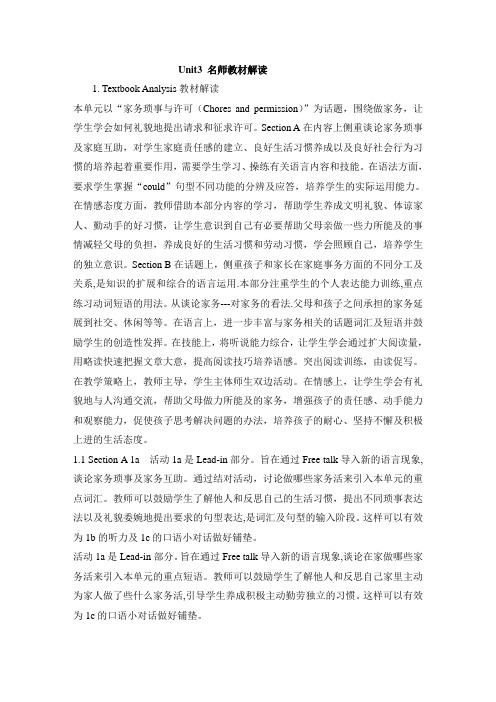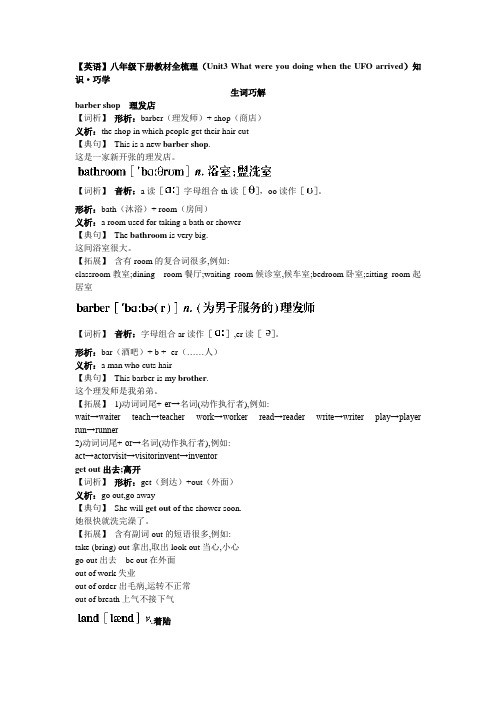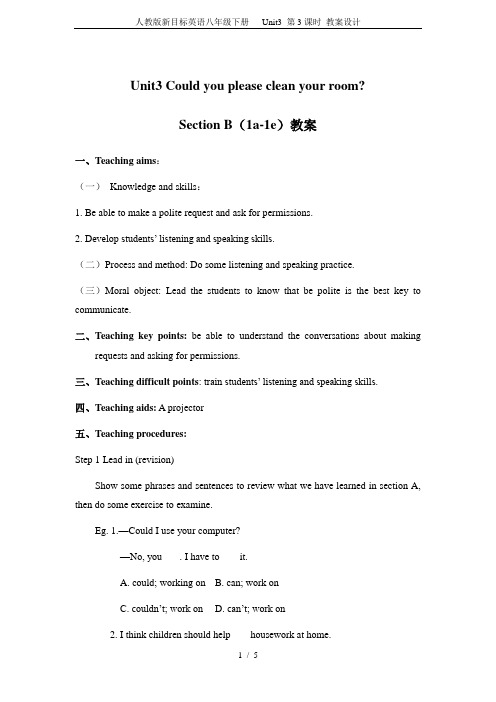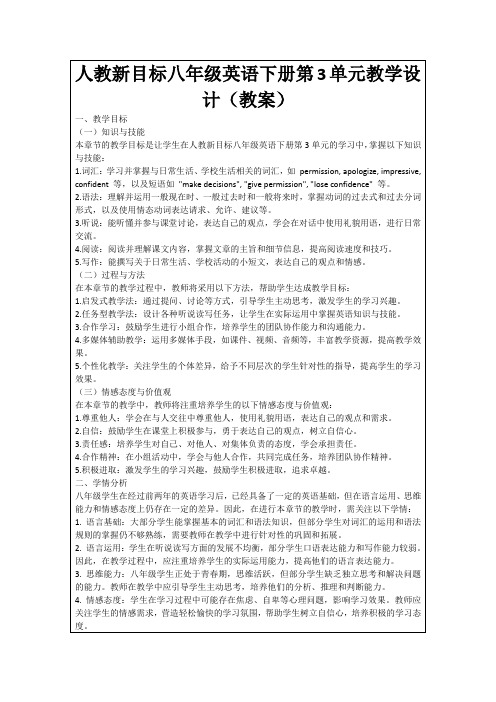新目标人教版八年级英语下册Unit3学案资料讲解
人教版英语八年级下册Unit3教材解读(英语教案)

Unit3 名师教材解读1. Textbook Analysis教材解读本单元以“家务琐事与许可(Chores and permission)”为话题,围绕做家务,让学生学会如何礼貌地提出请求和征求许可。
Section A在内容上侧重谈论家务琐事及家庭互助,对学生家庭责任感的建立、良好生活习惯养成以及良好社会行为习惯的培养起着重要作用,需要学生学习、操练有关语言内容和技能。
在语法方面,要求学生掌握“could”句型不同功能的分辨及应答,培养学生的实际运用能力。
在情感态度方面,教师借助本部分内容的学习,帮助学生养成文明礼貌、体谅家人、勤动手的好习惯,让学生意识到自己有必要帮助父母亲做一些力所能及的事情减轻父母的负担,养成良好的生活习惯和劳动习惯,学会照顾自己,培养学生的独立意识。
Section B在话题上,侧重孩子和家长在家庭事务方面的不同分工及关系,是知识的扩展和综合的语言运用.本部分注重学生的个人表达能力训练,重点练习动词短语的用法。
从谈论家务---对家务的看法.父母和孩子之间承担的家务延展到社交、休闲等等。
在语言上,进一步丰富与家务相关的话题词汇及短语并鼓励学生的创造性发挥。
在技能上,将听说能力综合,让学生学会通过扩大阅读量,用略读快速把握文章大意,提高阅读技巧培养语感。
突出阅读训练,由读促写。
在教学策略上,教师主导,学生主体师生双边活动。
在情感上,让学生学会有礼貌地与人沟通交流,帮助父母做力所能及的家务,增强孩子的责任感、动手能力和观察能力,促使孩子思考解决问题的办法,培养孩子的耐心、坚持不懈及积极上进的生活态度。
1.1 Section A 1a 活动1a是Lead-in部分。
旨在通过Free talk导入新的语言现象,谈论家务琐事及家务互助。
通过结对活动,讨论做哪些家务活来引入本单元的重点词汇。
教师可以鼓励学生了解他人和反思自己的生活习惯,提出不同琐事表达法以及礼貌委婉地提出要求的句型表达,是词汇及句型的输入阶段。
英语人教版新目标八年级下册知识整理Unit3

【英语】八年级下册教材全梳理(Unit3 What were you doing when the UFO arrived)知识·巧学生词巧解barber shop理发店【词析】形析:barber(理发师)+ shop(商店)义析:the shop in which people get their hair cut【典句】This is a new barber shop.这是一家新开张的理发店。
【词析】音析:a读[]字母组合th读[],oo读作[]。
形析:bath(沐浴)+ room(房间)义析:a room used for taking a bath or shower【典句】The bathroom is very big.这间浴室很大。
【拓展】含有room的复合词很多,例如:classroom教室;dining room餐厅;waiting room候诊室,候车室;bedroom卧室;sitting room起居室【词析】音析:字母组合ar读作[],er读[]。
形析:bar(酒吧)+ b + -er(……人)义析:a man who cuts hair【典句】This barber is my brother.这个理发师是我弟弟。
【拓展】1)动词词尾+-er→名词(动作执行者),例如:wait→waiter teach→teacher work→worker read→reader write→writer play→player run→runner2)动词词尾+-or→名词(动作执行者),例如:act→actorvisit→visitorinvent→inventorget out出去;离开【词析】形析:get(到达)+out(外面)义析:go out,go away【典句】She will get out of the shower soon.她很快就洗完澡了。
【拓展】含有副词out的短语很多,例如:take (bring) out拿出,取出look out当心,小心go out出去be out在外面out of work失业out of order出毛病,运转不正常out of breath上气不接下气.着陆【词析】音析:land为闭音节词,字母a读作[]。
人教版新目标英语八年级下册 Unit3 第3课时 教案设计

Unit3 Could you please clean your room?Section B(1a-1e)教案一、Teaching aims:(一)Knowledge and skills:1. Be able to make a polite request and ask for permissions.2. Develop students’ listening and speaking skills.(二)Process and method: Do some listening and speaking practice.(三)Moral object: Lead the students to know that be polite is the best key to communicate.二、Teaching key points:be able to understand the conversations about makingrequests and asking for permissions.三、Teaching difficult points: train students’ listening and speaking skills.四、Teaching aids: A projector五、Teaching procedures:Step 1 Lead in (revision)Show some phrases and sentences to review what we have learned in section A, then do some exercise to examine.Eg. 1.—Could I use your computer?—No, you ___. I have to ___ it.A. could; working onB. can; work onC. couldn’t; work onD. can’t; work on2. I think children should help ___ housework at home.A. toB. withC. forD. of3. Could you please _________ (make)your bed.4. Mary______ (make) her bed every day.5. Look! my mother ____________ (fold) the clothes6. He _______ (sweep)the floor and _______ (take) out the rubbish yesterday . Step 2 Presentation1. learn new words: listen to the tape.2.lead inLo ok at the pictures and ask students “What do your parents ask you to do?” and What do you ask your parents’ permission for?上图是图片导入3.activities 1aLet students know what they should do in this part. Say, look at items on the list. Some of these things only parents usually ask and some of them only teenagers usually ask. Ask students to complete the writing on their own books. Remind the students to write “parents” after each item parents ask teenagers to do, and write “teenagers” after each item teen agers ask their parents to do.Check the answers and try to remember these phrases.1.buy some drinks and snacks2. borrow some money3. clean your room4. invite my friends to a party5. go to the store6. use your CD player7. take out the rubbish8. make your bed4. Teach activity 1bThis activity provides guided oral practice using the target language.Point out the sample conversation, ask students to read it. Then make their own conversations by using the phrases in 1a.Parent: Could you please…?Child: Yes, sure. / Sorry, I can’t. I have to ...clean your roomtake out the rubbishChild: Could I …?Parent: Yes, you can. / No, you can’t. You ...buy some drinks and snacksborrow some moneyinvite my friends to a partygo to the storeStep 3 listening Practice1.Teach activity 1cRead the instructions. Point to the items in 1a. Say, listen to the conversation between Sandy and her mom. Please check each item they talked about.Play the recording for twice. Then correct the answers.2.Teach activity 1dThis activity gives students practice in understanding and writing the target language. Say, this time you have to write what the three people are going to do.Play the recoding again. Let students finish this part. Then correctthe answers.Step 4 Consolidation: teach activity 1eThis activity provides guided oral practice using the target language. imagine, one student has the party and ask for help to do chores. And then try to write on the paper.Step 5 SummaryIn this period, we have mainly done some listening and speaking practice to consolidate the target language. Through the practice, we also developed our listening and speaking skills.Step 6 Homework1.Remember the words and phrases in 1a.2.To preview the e-mail message on P22, finish 2c,2d.。
人教新目标八年级英语下册Unit 3 Period 1 Section A教案

精品基础教育教学资料,请参考使用,祝你取得好成绩!Unit 3 Could you please clean your room Period 1 Section A Step 1 Warming-upSing the song and dance to the musicStep 2 Presentation1. W atch the photos and talk about them “W hat does he do every day?’ and learnthese phrases: do chores, do the dishes, make the bed, take out the rubbish,fold the clothes, do the laundry, clean the living room.2. Look these phrases and practice the conversation: Could you please takeout the rubbish? Sure. / Sorry, I can’ t. I have to finish homework first.3. 1a Do you do these chores at home? Discuss them with your partner.Step 3 Listening1b Listen. Who will do these chores? Check (√) Peter’s mother or Peter.Step 4 Practice1c Make conversations about the chores in 1a.Make conversations.ExamplesA: Could you please...?B: Yes, sure. /All right. /No problem./Certainly.Sorry, I can't. I have to do...Sorry, I can't. I am doing...Step 5 Listening 2a&2bPeter asks his father if he can do four things. What does his father say? Check (√) “yes” or “no”. Listen again. Draw lines to the reasons.Step 6 Practice2c Make conversations using the information in 2a and 2bA: Could I use your computer?B: Sorry. I’m going to work on it now.A: Well, could I watch TV?B: Yes, you can. But first you have to clean your room?2d Role –play the conversationStep 7 Language points and summary1. help out 动词短语,表示在某人繁忙或遇到困难时“给予帮助”。
人教新目标八年级英语下册第3单元教学设计(教案)

-引导学生通过预测、提问、总结等策略,提高阅读理解的深度和广度。
(二)教学设想
1.情境教学法:将学生带入真实的语言环境,让他们在情境中感知、体验和运用语言。
-设想实践:利用多媒体资源,如视频、音频,创建生动的情境,让学生在情境中学习。
2.互动式教学:鼓励学生参与课堂讨论,促进学生之间的互动,提高课堂活跃度。
人教新目标八年级英语下册第3单元教)知识与技能
本章节的教学目标是让学生在人教新目标八年级英语下册第3单元的学习中,掌握以下知识与技能:
1.词汇:学习并掌握与日常生活、学校生活相关的词汇,如permission, apologize, impressive, confident等,以及短语如"make decisions", "give permission", "lose confidence"等。
2.听说能力:提高学生的听说能力,尤其是日常交流中的礼貌用语和表达请求、允许的能力,是本章节的另一个重点和难点。
-教学设想:利用角色扮演、小组讨论等形式,模拟真实场景,让学生在互动中练习听说技巧。
-定期举办英语角活动,鼓励学生大胆开口,提高口语表达能力。
3.阅读理解:培养学生快速捕捉文章主旨和细节信息的能力,是阅读教学的重点。
在本环节中,教师将通过以下步骤引导学生进入新课的学习:
1.利用多媒体展示与新课主题相关的图片或视频,激发学生的兴趣和好奇心。
-例如,展示一些学生在学校参加活动的照片,引导学生关注学校生活中的规则和礼貌。
2.提出问题,引导学生思考与新课内容相关的话题。
-如:“Can you tell me what you need to do before you take part in a school activity?”
2020-2021学年人教版英语八年级下册Unit3SectionA(6课时)教案

-举例:组织口语交流和写作活动,如编写旅行日记或小组讨论旅行经历,强调时态的正确运用。
四、教学流程
(一)导入新课(用时5分钟)
同学们,今天我们将要学习的是Unit 3 Section A的旅行主题。在开始之前,我想先问大家一个问题:“你们在旅行中有没有遇到过特别难忘的经历?”这个问题与我们将要学习的内容密切相关。通过这个问题,我希望能够引起大家的兴趣和好奇心,让我们一同探索旅行中的精彩故事。
在教学过程中,我注意到学生对一般过去时态的掌握程度不尽相同。一些学生在运用不规则动词的过去式时感到困难,而另一些学生则在构建疑问句时遇到了挑战。为了帮助学生克服这些难点,我采用了不同的教学策略,如记忆口诀、对比练习和角色扮演活动。这些方法似乎对学生有所帮助,但我认为在未来的教学中,我还需要寻找更多创新和有趣的方式来加强学生对这些难点的理解和记忆。
3.重点难点解析:在讲授过程中,我会特别强调一般过去时态的动词形式和疑问句结构这两个重点。对于不规则动词过去式和时态区分这些难点,我会通过举例和对比来帮助大家理解。
(三)实践活动(用时10分钟)
1.分组讨论:学生们将分成若干小组,每组讨论一个与旅行相关的实际问题,如如何用一般过去时态描述旅行中的活动。
2020-2021学年人教版英语八年级下册Unit 3 Section A(6课时)教案
一、教学内容
2020-2021学年人教版英语八年级下册Unit 3 Section A围绕“旅游”主题展开,本教案涵盖6课时。教学内容如下:
1.第一课时:Section A 1a-1c,学习描述旅行经历的一般过去时态,掌握重点词汇如attraction, exciting, ancient等,并学会运用Where did you go? How did you go there? What did you do there?等进行交流。
及分析人教版英语八年级下册Unit3大单元教学设计

-定期组织展示活动,让学生在实践中展示自己的学习成果,增强自信心。
4.教学延伸:
-鼓励学生参与学校或社区的实际志愿者活动,将所学知识运用到实践中。
-建立学习小组,利用课后时间进行英语角活动,提高学生的语言实际运用能力。
-结合单元主题,开展跨学科活动,如社会调查、研究报告等,拓宽学生的学习视野。
4.口语作业:与家人或朋友进行一次关于志愿者工作的英语对话,尝试使用本节课学到的词汇和时态,记录下对话内容。
5.研究任务:选择一个感兴趣的志愿者组织或活动,通过网络或图书馆资源,了解该组织或活动的基本信息、活动宗旨和参与方式,下节课向同学分享。
作业布置注意事项:
-确保作业难度适中,既能巩固课堂所学,又不会给学生造成过重的负担。
四、教学内容与过程
(一)导入新课
在这一阶段,教师将运用多媒体资源,以生动有趣的方式导入新课。首先,在大屏幕上展示一组志愿者活动的图片,如环保清洁、帮助老人过马路等,让学生们观察并思考这些图片中的共同点。随后,提出问题:“What are they doing? Why do they do these things?”引导学生展开思考。
(二)过程与方法
在本章节的教学过程中,教师将采用以下方法帮助学生达成学习目标:
1.采用任务型教学法,引导学生通过完成具体的任务,如小组讨论、角色扮演等,提高英语实际运用能力。
2.利用多媒体教学资源,如图片、视频等,激发学生的学习兴趣,增强课堂的趣味性。
3.通过小组合作学习,培养学生的团队协作能力和沟通能力。
-通过真实语境的创设,让学生在实践中感受时态的用法,提高口语表达能力。
-引导学生通过预读、细读和总结等步骤,提高阅读理解能力。
人教版新目标八年级下Unit3全单元导学案(15页)(精修版)

人教版英语精品资料(精修版)Unit 3 Could you please clean your room? (Section A 1a-2d) 【知识技能目标】✧掌握并灵活运用本课的重点词汇rubbish fold sweep floor mess✧重点短语sweep the floor, work on, finish doing, take out the rubbish✧听懂“请求做家务活动”的相关话题及文章;学会有礼貌地提出请求和请求准许【情感态度目标】✧主动地去帮助家人做杂务【自主学习】1.______________洗餐具2._________________ 倒垃圾3.fold the clothes______________4.sweep the floor _____________5.make your/the bed ______________6.___________________打扫客厅7.______________没问题8.______________ 出去吃饭9.stay out late ______________10.go to the movies _____________11.get a ride 搭车12.work on 从事13.______________做完某事14.______________ 干净又整洁【合作探究】1.I think two hours of TV is enough foryou!我认为两个小时的电视对你来说足够了!【观察】主谓一致One and a half hours is enough. 一个半小时足够了。
One of my favorite sports is basketball.我最喜欢的一项运动时篮球【小结】谓语动词与主语要在人称和数上保持一致。
Two months_____ a long holiday.两个月是一个长假。
- 1、下载文档前请自行甄别文档内容的完整性,平台不提供额外的编辑、内容补充、找答案等附加服务。
- 2、"仅部分预览"的文档,不可在线预览部分如存在完整性等问题,可反馈申请退款(可完整预览的文档不适用该条件!)。
- 3、如文档侵犯您的权益,请联系客服反馈,我们会尽快为您处理(人工客服工作时间:9:00-18:30)。
Unit 3 Could you please clean your room?一、What do parents ask their teenagers to do?(2 x 8)1. 洗餐具_________________________2. 倒垃圾___________________________3. 叠衣服_________________________4. 扫地___________________________5. 铺床_________________________6. 打扫厨房__________________________7. 带狗出去遛遛____________________ 8. 分担家务_________________________二、What do teenagers ask their parents’ permission for? (2x 8)1. 和朋友外出吃饭_____________________2. 使用CD播放机______________________3. 晚归________________________4. 搭便车____________________________5. 和朋友出去玩_______________________6. 邀请朋友来参加聚会___________________7. 向父母借钱_________________________ 8. 买一些饮料和零食_________________________三、other phrases (2 x 8)1. 惊讶地___________________________2. 讨厌做某事__________________________3. 把盐递给我_______________________4. 有压力_______________________________5. 浪费时间__________________________6. 做某事是不够的_______________________7. 介意做某事________________________ 8. 理解公平的概念________________________四、Sentences(3 x 17)1. —你能借点钱给我吗?—嗯,你要多少?用来做什么?–________________________ me some money?–Hmm. ___________ do you need? And ___________?2. —可以至少让我看完这个电视节目吗?—不行。
我认为你看两小时电视够多了!–Could I ___________ finish __________ this show?–No. I think two hours of TV ___________________!3. 妈妈买完东西随时会回来。
如果她看到这么乱会生气的。
Mom will _______________ shopping _________________. And she won’t be happy if _______________.4. Peter的妈妈得在奶奶来之前打扫好客厅。
Peter’s mom _________________________ before his grandma _______________.5. 我刚刚做到电视前面,妈妈便走了过来。
__________________ I sat down in front of the TV, my mom came over.My mom came over __________________ I sat down in from of the TV.6. Nancy成天看电视,在家从来不帮忙。
Nancy watches TV ____________________ and _____________________________________________.7. 整整一周妈妈没有做任何家务,我也不做。
For a week, mom ______________________________________, and _____________________________.8. 第二天,妈妈下下班回家发现屋子既干净又整洁。
__________________, my mom came home from work _________________________________________.9. 我不明白为什么一些家长要让他们的孩子在家做家务劳动。
I do not understand_____________________________________________ housework and chores at home.10. 他们应当花时间在功课上,以取得好成绩,考上一所好大学。
They should _________________ schoolwork ________________ get good grades and _______________.11. 他们长大后必须做家务,所以对他们来说,现在没有必要做家务。
When they _____________, they ____________ do housework so _____________________________ now.12. 在家为自己的孩子提供一个干净、舒适的环境是家长们的职责。
It is _______________ to _____________________________________________at home for their children.13. 做些家务琐事可以帮助培养孩子的独立性,教他们如何照顾自己。
_____________ helps to ___________________________and __________________ look after themselves.14. 既然他们与父母同住在一个屋檐之下,他们应该知道每个人都应当尽力保持家里干净整洁。
___________ they live in one house with their parents, they should know that ___________________________________.15. 我们邻居的儿子上了一所好大学,但在他入学的头一年,他却全然不知如何照料自己。
Our neighbor’s son _______________ but during his first year, he ________________________________.16. 结果,他经常生病,成绩下滑。
____________________, he often ______________________ and ________________________________.17. 孩子们越早学会独立,对他们的未来就越好。
_______________ kids learn __________________________, the better ___________________________.Unit 3 Could you please clean your room?二、What do parents ask their teenagers to do?(2 x 8)1. 洗餐具do the dishes2. 倒垃圾take out the rubbish3. 叠衣服fold the clothes4. 扫地 sweep the floor5. 铺床make the bed6. 打扫厨房clean up the kitchen7. 带狗出去遛遛take the dog for a walk8. 分担家务share the housework二、What do teenagers ask their parents’ permission for? (2x 8)1. 和朋友外出吃饭go out for dinner with friends2. 使用CD播放机use the CD player3. 晚归stay out late4. 搭便车get a ride5. 和朋友出去玩hang out with (my) friends6. 邀请朋友来参加聚会invite my friends to a party7. 向父母借钱borrow some money from my parents8. 买一些饮料和零食buy some drinks and snacks三、other phrases (2 x 8)1. 惊讶地in surprise2. 讨厌做某事hate to do3. 把盐递给我pass me the salt4. 有压力have stress5. 浪费时间a waste of time6. 做某事是不够的it is not enough to do7. 介意做某事mind doing sth. 8. 理解公平的概念understand the idea of fairness四、Sentences(3 x 17)1. —你能借点钱给我吗?—嗯。
你要多少?用来做什么?–Could you please lend me some money? –Hmm. How much do you need? And what for?2. —可以至少让我看完这个电视节目吗?—不行。
我认为你看两小时电视够多了!–Could I at least finish watching this show? –No. I think two hours of TV is enough for you!3. 妈妈买完东西随时会回来。
如果她看到这么乱会生气的。
Mom wil l be back from shopping any minute now. And she won’t be happy if she sees this mess.4. Peter的妈妈得在奶奶来之前打扫好客厅。
Peter’s mom has to clean the living room before his grandma arrives.5. 我刚刚做到电视前面,妈妈便走了过来。
The minute I sat down in front of the TV, my mom came over. / My mom came over as soon as I sat down in from of the TV.6. Nancy成天看电视,在家从来不帮忙。
